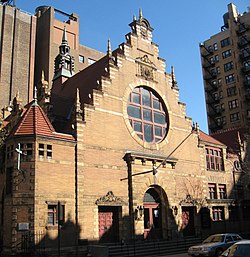West End Collegiate Church
|
West End Collegiate Church
and Collegiate School |
|
 |
|
| Location | West End Ave. and W. 77th St., New York, New York |
|---|---|
| Coordinates | 40°46′58″N 73°58′55″W / 40.78278°N 73.98194°WCoordinates: 40°46′58″N 73°58′55″W / 40.78278°N 73.98194°W |
| Built | 1892 |
| Architect | Robert W. Gibson |
| Architectural style | Dutch-Flemish Renaissance Revival |
| NRHP Reference # | 80002729 |
| Significant dates | |
| Added to NRHP | May 6, 1980 |
| Designated NYCL | January 11, 1967 |
The West End Collegiate Church is a church on West End Avenue at 77th Street on Manhattan's Upper West Side. It is part of The Collegiate Reformed Protestant Dutch Church in the City of New York, the oldest Protestant church with a continuing organization in America. The West End Collegiate Church and Collegiate School, which includes the adjacent Collegiate School, is listed on the U.S. National Register of Historic Places.
West End Collegiate was built as part of the rapid development of the Upper West Side in the late nineteenth century—from country estates to an urban neighborhood of town houses and, later, apartment buildings. On October 16, 1890, the Consistory of the Collegiate Church instructed the "Committee on a new church site west of Central Park" to price several plots of land of a minimum size of seven lots. The Committee purchased four lots on West End Avenue and three lots on 77th Street for $89,000. A building committee was formed and construction began in 1891. The building stood complete in the fall of 1892 and dedicated on November 20, 1892. On November 19, 1892, The Reverend Henry Evertson Cobb of West Troy, New York was called to become the first minister of the Church.
During World War II the church was a center for the Dutch refugee and relief effort; Princess Juliana of the Netherlands visited twice during the war.
The church and collegiate school buildings together were designated a New York City Landmark in 1967 and listed on the National Register of Historic Places in 1980.
The church was designed by McKim Mead & White in Dutch Colonial style, a subset of the Renaissance revival style. Many buildings on West End Avenue and the upper West Side were being built in this style at that time.
...
Wikipedia



